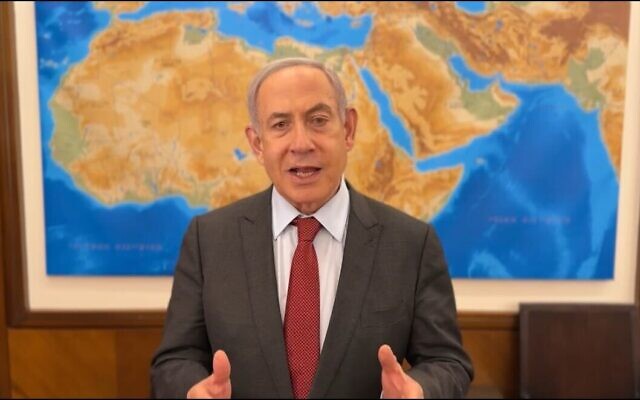The commencement of the Muslim holy month of Ramadan at Gaza in early March was accompanied with disappointment as negotiators failed to achieve a ceasefire agreement.
By Tuesday, as the period of fasting was nearing its end, the rate of progress in the war had decreased.
However, the possibility of experiencing respite and long-lasting peace in the war-torn region remained difficult to achieve.
The cease-fire negotiations are currently experiencing difficulties, with Hamas expressing doubt on the possibility of reaching an agreement.
Additionally, Prime Minister Benjamin Netanyahu of Israel has reaffirmed his determination to invade Rafah, the remaining area of the Gaza Strip that has not yet been occupied by the Israeli military.
“On Tuesday, he stated that we will fully eradicate Hamas’s battalions, including those in Rafah,” “There is no power in the world that can prevent us from achieving our goals.”
Israel has been repeatedly cautioned by its friends and the international community that entering Rafah would lead to a severe humanitarian crisis.
However, Mr. Netanyahu’s statements to military recruits on Tuesday, which came after his declaration that there is a certain date for the planned Rafah attack, clearly indicated that he was not discouraged.
Hamas announced via the messaging app Telegram early Tuesday that it is now evaluating the most recent cease-fire proposal, despite the fact that its requests have not been fulfilled.
The negotiations have been mediated by Egypt, Qatar, and the United States.
The level of active combat in the 140-square-mile area has decreased to its lowest level since November.
Israel withdrew its military forces from southern Gaza throughout the weekend, enabling certain individuals to come back and assess the condition of their residences in the southern city of Khan Younis.
However, upon their return, they discovered that a significant portion of the city had been completely destroyed.
Experts stated that the withdrawal of military forces indicated a shift in the war’s progression, rather than suggesting the probability of a lasting cessation of hostilities.
Israeli officials attributed the pullout to the successful military accomplishments on the battlefield.
The holiday of Eid al-Fitr, which signifies the conclusion of the holy month of Ramadan, is scheduled to commence in Gaza on Wednesday.
Typically, it is a festive occasion characterized by family gatherings, new garments, and indulgence in delicious confections.
However, this year, the people of Gaza are experiencing Eid in the midst of widespread famine and severe scarcity of essential items, in addition to the devastation and loss of life that have affected every part of the region during six months of conflict.
Throughout the month of Ramadan, around 2,000 individuals perished in the conflict, resulting in a total death toll of over 33,000 since the commencement of the war on October 7th.
These figures, provided by Gaza’s Health Ministry, do not differentiate between civilians and fighters in their statistical analysis.
The Israeli organization COGAT, which is in charge of organizing the delivery of supplies to Gaza, said that on Monday, a total of 419 trucks carrying humanitarian assistance entered the area.
741 humanitarian aid trucks were inspected and transferred to the Gaza Strip over the last 2 days.
Only 267 aid trucks were distributed by @UN aid agencies inside Gaza (out of which 146 carried food).The aid is available, distribution is what matters. https://t.co/def8xdYUF1
— COGAT (@cogatonline) April 9, 2024
This is the highest number of trucks since the conflict began.
Prior to the commencement of the war, a daily average of 500 commercial and aid vehicles were being admitted, a quantity that aid agencies assert to be essential.
On Monday, the heads of state of Egypt, Jordan, and France issued a joint opinion essay in The Washington Post and other publications, calling for an urgent cessation of hostilities in Gaza.
They highlighted the “devastating humanitarian suffering” and “unbearable human casualties” caused by the ongoing conflict.
King Abdullah II of Jordan, President Emmanuel Macron of France, and President Abdel Fatah El-Sisi of Egypt together advocated for a two-state resolution for the Palestinians, asserting that it is the sole viable approach to achieving peace.
They also cautioned Israel against launching an invasion of Rafah.
“The authors of the essay argue that launching such an offensive would result in increased casualties and suffering, raise the likelihood and severity of large-scale displacement of the people in Gaza, and pose a threat of further escalation in the region,” they stated in their essay.
(The headline and the story has not been edited by THND staff and is published from a syndicated feed. However there can be minor changes from the original source article.)
Further Reading :
- https://www.nytimes.com/2023/04/21/world/middleeast/eid-ramadan-gaza-palestinians.html
- https://www.nytimes.com/2024/04/07/world/middleeast/israel-troops-gaza.html
- https://www.nytimes.com/2024/04/08/world/middleeast/israel-gaza-war.html
- https://www.gov.il/en/departments/news/event-idf090424
- https://www.nytimes.com/live/2024/04/08/world/israel-hamas-war-gaza-news?smid=url-share#cease-fire-negotiations-continued-to-sputter-on-monday
- https://www.nytimes.com/2024/03/10/world/middleeast/ramadan-israel-gaza-cease-fire.html
- https://www.aljazeera.com/news/2024/4/9/israel-says-date-set-for-rafah-invasion-amid-ongoing-gaza-truce-talks
- https://www.reuters.com/world/middle-east/israel-hits-rafah-air-us-urges-rethink-ground-2024-03-19/

